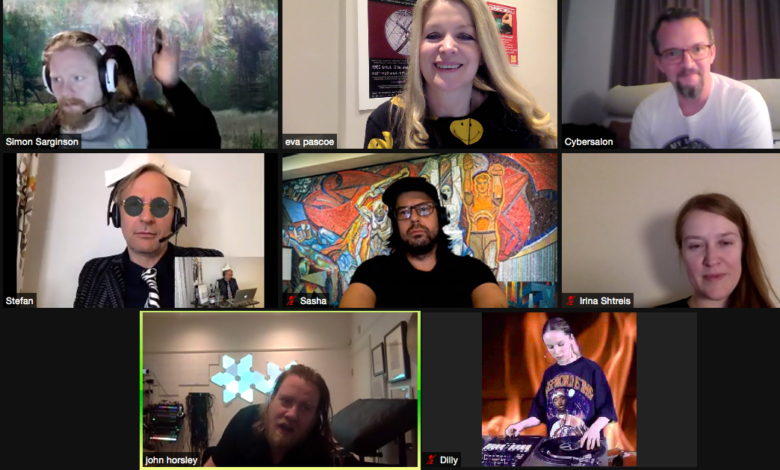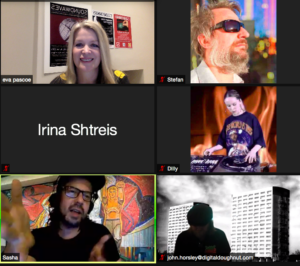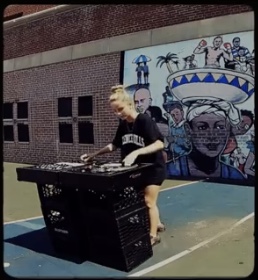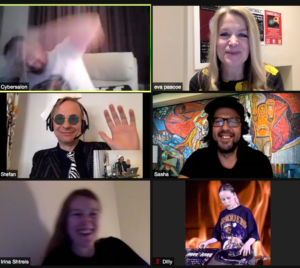
Musica est spiritus vitae: Art’s Birthday 2021 – live review
by Irina Shtreis, from ‘Louder than War’
For those involved in contemporary art and net movement, in particular, January 17 is a date of special significance. Proposed as Art’s Birthday by French artist Robert Filliou, this day celebrates the beginnings of creative thought. Notwithstanding the earnestness of the idea, Filliou was apparently a big prankster as the date suggested as Art’s Birthday was in fact the birthday of the artist himself. Yet this event still brings together creative minds all over the globe. Keeping up with the tradition, Cybersalon held a special event in a fitting digital-only format. Entitled as Musica est spiritus vitae (Music is the spirit of life), the programme featured musicians and DJs who have been pushing the boundaries of what is considered as conventional. Britain, Austria, Iceland and Russia joined forces to mark the trajectory for the future.
The Art of Weaving

“We often think about computing as a solitary activity but here, although, we are in the world of abstract symbols, those evoke a straight physical response”, Alex McLean, a live coder and one of the Art’s Birthday’s panellists, comments on his slides introducing the algorithmic music approach through his Twitch channel. McLean, who presented the concept of live coding at Cybersonica in 2003, is known as one of the key figures working in this genre in Britain. The theoretical part is followed by an improvised live session where Alex weaves musical patterns relying on his handmade programming language called Tidal Cycles. Though the metaphor referring to a textile production is not just a random figure of speech. Going into the theory, Alex mentioned the principle of Jacquard mechanism which implies using “code as a material”. “I’m doing hand weaving driven by code”, Alex explains. “Algorithmic pattern is an idea that is actually ancient, it connects really well to computing but that is because computing is really the end of a long line of human engagement with computation and technology”.
Fight for Peace
Needless to say, the digital environment feels like a comfort zone for all participants despite some technical tweaks occasionally occurring. For some artists restrictions imposed by the pandemic became a kind of a creative booster. Telling about her projects, a New York-based hip hop artist and DJ Dilly Rowe seems to be the one who made the best of her lockdown experience. “My first official gig was actually a live stream event with a green screen”, Dilly Says. “It was organized four months before the lockdown and was completely unconnected to Covid. I think it’s kind of ironic that my first show was online so it actually felt familiar to go back.”
 During these turbulent times, Dilly has been busy, working on compilations, creating podcasts and launching a subscription-based DJ school as well as collaborating with artists online. Some works demonstrate that empowered by modern technology, creative force is capable of changing the world despite the borders and restrictions. Together with fellow DJs Rob Swift and Riz as well as Rebel Babel, a Polish brass band, Dilly did a composition for a transcontinental concert organized by the Universal Museum of Hip Hop on the International Day of Peace. Scratches and various bits played by the brass section and a carillon player were filmed in the US and Poland, edited and put together which resulted in a remarkable music video. Participating in this project which invoked creative spirits of two different continents felt very special to Dilly, who is Polish on her mother’s side. Overall the scope of her works concerns addressing various issues such as racism and violence. Looking into the future, the artist feels optimistic and eager to explore new formats such a VR club. There is, however, always more to see beyond the horizon, she admits. “DJing is not just about having a residency or club, there is a lot more than a gig that a DJ can do”, Dilly continues, “I’m trying to focus on what we can do and what creative things we can come up with in the meantime”. Together with a live coder Simon Sarginson Dilly prepared a special Art’s Birthday playlist comprising songs inspired by the fight for civil rights, peace and equality.
During these turbulent times, Dilly has been busy, working on compilations, creating podcasts and launching a subscription-based DJ school as well as collaborating with artists online. Some works demonstrate that empowered by modern technology, creative force is capable of changing the world despite the borders and restrictions. Together with fellow DJs Rob Swift and Riz as well as Rebel Babel, a Polish brass band, Dilly did a composition for a transcontinental concert organized by the Universal Museum of Hip Hop on the International Day of Peace. Scratches and various bits played by the brass section and a carillon player were filmed in the US and Poland, edited and put together which resulted in a remarkable music video. Participating in this project which invoked creative spirits of two different continents felt very special to Dilly, who is Polish on her mother’s side. Overall the scope of her works concerns addressing various issues such as racism and violence. Looking into the future, the artist feels optimistic and eager to explore new formats such a VR club. There is, however, always more to see beyond the horizon, she admits. “DJing is not just about having a residency or club, there is a lot more than a gig that a DJ can do”, Dilly continues, “I’m trying to focus on what we can do and what creative things we can come up with in the meantime”. Together with a live coder Simon Sarginson Dilly prepared a special Art’s Birthday playlist comprising songs inspired by the fight for civil rights, peace and equality.
The Future is Now

Other panellists seemed to have maintained a similarly positive attitude in their work. A Moscow-based DJ and musician Alexander Fedushkin, also known under his artistic moniker Hypnoton, has been teaching music production at Music Wave school in Moscow, making sound for art installations and developing software. Disillusioned with the idea of a live band, Alex created an app for his own use, an “artificial companion”, as he calls it. Hypnoton’s compositions are written on a semi-generative sampler which has no well-tempered tuning. Alex goes into the nitty-gritty of his approach which sounds somewhat intriguing: “All parts in this music are a little out of tune, and this, as I figured out eventually, is a good trick – when everything is out of tune it’s all paradoxically kind of pretty well-tuned”. Following the brief interview by Eva Pascoe, co-chairperson of Cybersalon, Alex played an immersive set, interspersed with atonal elements and accompanied by Northern-Lights-esque visuals.
Immersiveness is, indeed, what became a leitmotiv of the event. Introducing his work 153 seconds of Soviet Noise, Alexander Felch, a conceptual artist from Vienna, submerged the audience into the enigmatic atmosphere of the past. The project originally emerged from the tapes produced in the USSR in 1989 and accidentally found at one of the flea markets in St. Petersburg. Recalling the Soviet past, some participants compared it to the lockdown these days, assuming that, perhaps, now we have more reasons to be cheerful. However, the project created by Felch and his fellow artist Paul Gründorfer evokes something more than the archetypal image. Nostalgia for the future that was expected back then but still hasn’t happened?
With all the impressive acts presented online, Cybersonica yet proved that the future is within a hand’s reach. What happens further depends on us – the more eager we are to embrace it, the more opportunities it will be offering.
Curated by Eva Pascoe and Stefan Lutschinger (Middlessex University)
Watch Here
- Intro Eva Pascoe (Cybersalon.org)
- 6min -Live Coding demo by Alex McLean from Sheffield University
- 38min DJ Dilly interview with Irina Streis from Iceland
- 56min Live Coding by Simon Sarginson using Hydra to DJ Dilly and Rob Swift from New York
- 1h11min -Performance by John Horsley (Longstuff) from London
- 1h25min – Hypnaton (Sasha) from Moscow
- 1h52 – Transient Hole, Alex from Vienna (Sound Artists collective launching a new catalogue)




